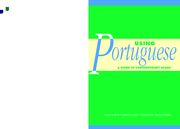Book contents
- Frontmatter
- Contents
- List of abbreviations
- Acknowledgments
- 1 Introduction
- 2 Written expression
- 3 Vocabulary
- 4 Nouns and adjectives
- 5 Verbs
- 6 Reported speech
- 7 Pronouns and articles
- 8 Adverbs
- 9 Comparatives and superlatives
- 10 Interrogatives
- 11 Fields of meaning – vocabulary extension
- 12 Portuguese for Spanish speakers
- Index of Portuguese words
9 - Comparatives and superlatives
Published online by Cambridge University Press: 05 June 2012
- Frontmatter
- Contents
- List of abbreviations
- Acknowledgments
- 1 Introduction
- 2 Written expression
- 3 Vocabulary
- 4 Nouns and adjectives
- 5 Verbs
- 6 Reported speech
- 7 Pronouns and articles
- 8 Adverbs
- 9 Comparatives and superlatives
- 10 Interrogatives
- 11 Fields of meaning – vocabulary extension
- 12 Portuguese for Spanish speakers
- Index of Portuguese words
Summary
Comparatives of inequality
Comparing qualities
In order to form comparatives of inequality in Portuguese, neither the adjectives nor adverbs are modified. Adjectives must always agree with the first item being compared in both number and gender. The following contruction is utilized:
1st item + verb + mais (more) or menos (less) + adjective or adverb + do que + 2nd item
Examples:
Eu sou mais alto do que você.
I am taller than you.
Hoje em dia as pessoas são mais felizes do que antigamente.
Nowadays people are happier than before.
The same construction with menos do que is used to express “less than.”
Example:
Um rato é menos inteligente do que um chimpanzé.
A rat is less intelligent than a chimpanzee.
Note: The word do may be, and often is, omitted in comparative constructions, both in spoken and written discourse.
Comparing quantities
The following construction is used when comparing quantities of nouns:
1st item + verb + mais or menos + noun + do que + 2nd item
In order to form comparatives of inequality, the forms mais (do) que and menos (do) que are used to denote “more than” or “less than.”
Example:
Estudo mais horas do que tu, or Estudo mais horas que tu.
I study more hours than you.
Example:
Ele tem mais amigos do que seu irmão.
He has more friends than his brother.
Special comparative (and superlative) adjectives and adverbs
The following adjectives and adverbs are used in place of the structures with mais and menos:
melhor (better/best)
pior (worse/worst)
menor (smaller/smallest)
maior (bigger/biggest)
Example:
Ayrton Senna era melhor piloto de Fórmula 1 que muitos outros mais conhecidos.
- Type
- Chapter
- Information
- Using PortugueseA Guide to Contemporary Usage, pp. 181 - 184Publisher: Cambridge University PressPrint publication year: 2004



